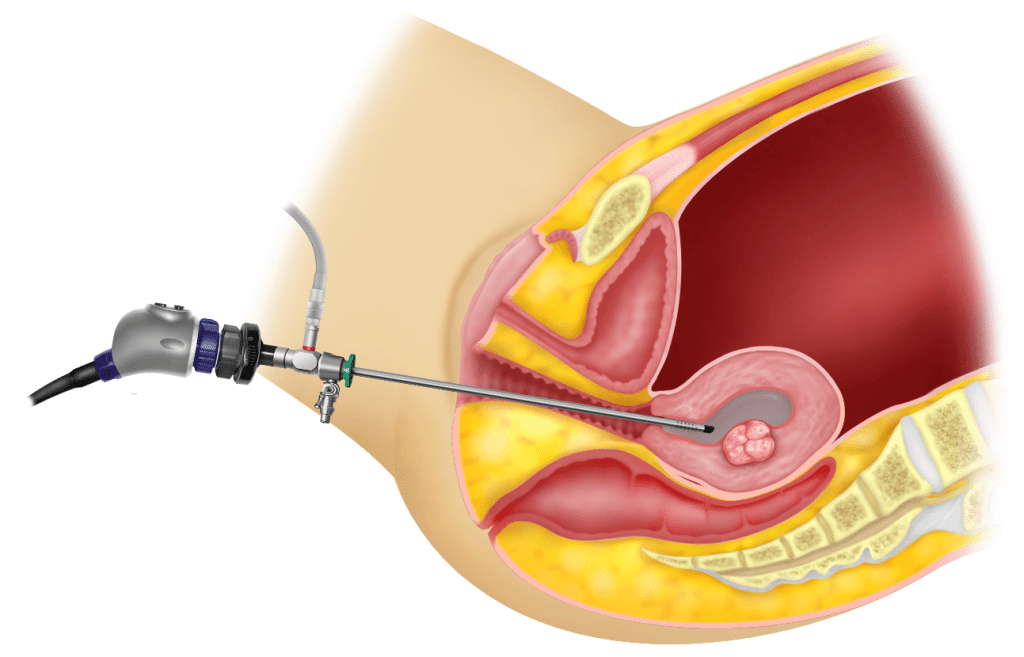Hysteroscopy treatment in Thane
What exactly is a hysteroscopy?
Hysteroscopy is a minimally invasive surgery.
A small telescope (hysteroscope) is inserted through the cervix into the uterus by the gynecologist. On a video display, the hysteroscope enables the surgeon to see within the uterine cavity. The uterine cavity is next examined for any irregularities. The shape of the uterus, the lining of the uterus, and any indications of intrauterine disease are all examined by the surgeon (fibroids or polyps). The surgeon also attempts to visualize the openings to the fallopian tubes.
How is the hysteroscopy procedure carried out?
The surgeon starts by administering anesthesia. The cervix is dilated once the patient is relaxed, and the hysteroscope is introduced into the vagina and the cervix to access the uterus. Air is passed through the hysteroscope to dilate the uterus and to push away blood and mucus. The light and camera connected to the hysteroscope’s end enable the surgeon to see into the uterine cavity as well as the fallopian tubes into the uterus. After a condition is diagnosed, surgical instruments are introduced via the hysteroscope and treatment is performed. For a day or two after the hysteroscopy, the patient may have some discomfort and cramping. There may be some vaginal bleeding, as well as abdominal pain and fever. It may be relieved by painkillers after the procedure.
What are the advantages of a hysteroscopy?
The recovery time is very fast. Almost all hysteroscopic surgery patients go home the same day. Because there is no abdominal incision, postoperative discomfort is low, and no wound infections occur.
What procedures may a gynecologist conduct using a hysteroscope?
Many gynecologists may use a hysteroscope to examine the uterine lining for intrauterine disease such as fibroids or polyps that may be causing irregular or excessive menstrual flow. A cavity examination is often conducted for women who are experiencing problems getting pregnant. Other conditions suitable for hysteroscopy include
- Endometrial or cervical polyp removal
- Fibroid excision
- Endometrial lining biopsies
- Cannulation (opening) of the fallopian tubes
- Intrauterine adhesion removal (scarring)
- Replacement of a lost IUD (intrauterine contraceptive device)
- Endometrial ablation is a therapy for irregular or excessive menstrual flow.
What is the typical recovery time after hysteroscopy?
Recovery tends to be very quick as there are no incisions. Most patients may need pain medication in the early post-operative time, although an anti-inflammatory medicine will generally be sufficient. strenuous activities should be avoided for two weeks. It is best to avoid putting anything into the vagina for at least two weeks, including tampons. The majority of women may return to work after two weeks
What should I expect immediately following the hysteroscopic surgery?
- Uterine cramps or abdominal pain
- Bleeding in the cervix
- Lightheadedness or nausea
When should you call your doctor following a hysteroscopy?
You should not hesitate to call the doctor if you develop any of the following symptoms:
- Significant vaginal bleeding (greater than one sanitary napkin per hour)
- Fever
- Urinary incontinence
- Abdominal discomfort that is severe or worsening
- Vomiting
- Breathing difficulty
For more information & consultation on Hysteroscopy treatment in Thane, visit Complete Women’s Care at Ghodbunder road, Thane, or contact us on 9833074977 or simply fill in your name and number & one of our team members will get in touch with you soon. Our team of experts along with Dr. Arohi Tasgaonkar, MS (ObGy), DNB (ObGy), and one of the best Gynecologist in Ghodbunder Road Thane will help you out in understanding your problem and guide you through every stage of your treatment.

